If you haven’t ever had a video game phase, you may find the first half of this essay weedy. If you have had a video game phase but did not come of age in the 1990s, you may find the second half of this essay obvious. If you had a video game phase when you were coming of age in the 1990s, you know where I’m coming from. This essay is for all of you.
The Super Nintendo Entertainment System (SNES) was released in North America in 1991 and is one of those landmark video game consoles, producing a slew of still-revered games in all of their 16-bit glory. One of those games was a trilogy called Mega Man X. It was an update of the original Mega Man (a.k.a. Rockman) series for the 8-bit Nintendo Entertainment System featuring a blue humanoid robot who ran around levels and shot at enemies. Was there a backstory? Yes, it had to do with a docile robot turning into a war machine in order to suppress an evil robot rebellion, but it isn’t really important. Mega Man X was essentially the same thing but with better graphics, cooler weapons and upgrades, and a conspicuous supporting character named Zero.
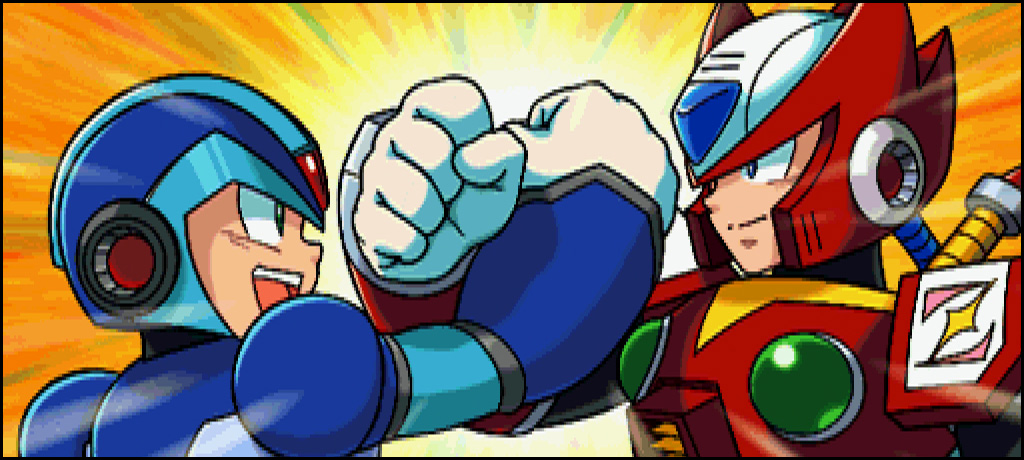
While Mega Man (X from now on) is blue and adolescent-looking, Zero is ripe red and fully-grown. He’s a head taller than X, has a massive blond ponytail (his designers must have seen some sort of advantage to it in battle…), a green light saber, and when he first appears at the end of the opening level to save X’s life, it’s immediately obvious that he is the superior fighter.
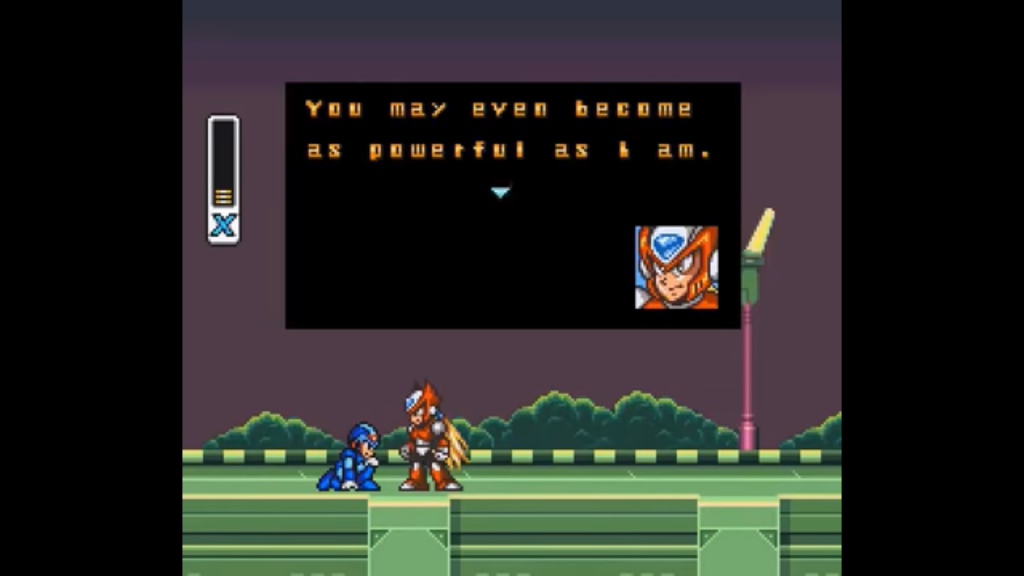
Pre-teen me always scoffed at the first lines of dialogue, especially when Zero patronizingly reminds X that he hasn’t yet reached his full power, that he could grow stronger, that he may even become as powerful as Zero himself. Well excuse me, Mr. I-Have-A-Light-Saber! Though I am an only child, I was sure that this was what having a self-righteous older brother must have been like.
But that thought went by in a relative flash. My excited gamer-boy mind zipped instead to picturing these two awesome characters battling the bad guys for the rest of the video game! Pyu-pyu! Wham! Boom! Yeah! Zero is rendered with the same level of detail as X which indicated to me that I would see the two sprites in action together. Light sabers! Guns! Pyu-pyu! But then, Zero drops a bomb:

What?
I’ll scout ahead???
I’m sorry Zero, but I must have misheard. You said you were scouting? What part of your 8-foot-tall ponytail-sporting and light saber-wielding self is designed for scouting? You’re saying that I, X, a pint-sized prepubescent robot still existentially struggling with his sentience and capabilities for violence, is being assigned to go kill the eight bosses and countless henchmen in the rest of this video game while you, the powerful one, scout around?
This confused me. In almost every superhero or action story I had known, the main characters were the exemplars, the very living symbols of strength, bravery, and leadership. Indiana Jones, Captain America, Thor, Wonder Woman, Son Goku, Theseus, Heracles…. When the world is in danger, it makes sense that you want to call the best-qualified, best-looking candidate to beat the bad guys. Obviously, under a magnifying glass this stereotype illuminates a multitude of issues, but at that age I was unequipped, and my unconscious reaction was confusion.
Fine. I get it. This is the Mega Man video game, not the Zero video game. I played on. I played through the end of the game in which Zero once again comes to X’s rescue by sacrificing himself. The cooler character was dead. Footnote: the game’s developers must have taken due note of the heartbroken reaction fans had to Zero’s death. I played on through Mega Man X2, the sequel, in which X fights eight more bosses alone in order to retrieve Zero’s confiscated parts and revive him. Seeing Zero arrive just before the final boss battle, my heart jumped like in the first game. They’re going to fight together to defeat Sigma once and for all! I’m so amped! But then, Zero drops a bomb:
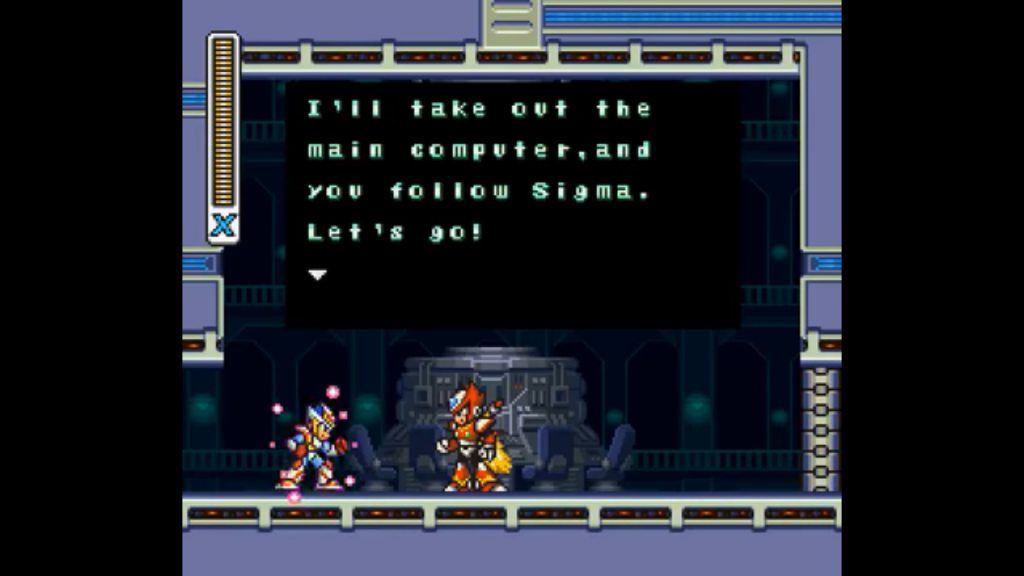
What?
Take out the main computer???
I’m sorry Zero, but I must have misheard. You are nominating X to battle Sigma, the Sauron of this universe, mano a mano while you go take out a computer? Are you anticipating you will use your light saber for that? Are you going to blast it with a full charge? Or maybe you’re planning something more efficient, more clever? Just tipping it over the edge of the table? Just pulling the power plug? I mean, the angles of attack are legion, but you don’t need to worry because it’s a goddam computer and it poses absolutely no physical threat to you. Maybe you might feel a pinch of static electricity when you touch the CPU, or maybe the fan will blow an unpleasant-smelling breeze in your face.
Maybe X and Zero are on the payroll of an equal opportunity employer who has instituted a policy under which stronger employees are obligated to cede job opportunities to weaker ones in order to promote parity in the workplace. Zero has watched the training video and is holding back for X’s benefit. I can hear the restraint in his voice, I can see it in his emerald nipples.
I played on. I took the plunge of death toward Sigma, died about one hundred times trying to beat him, then finally did, sacrificing many nights of middle school exam preparation. The wave of satisfaction that overcame me when the end credits rolled was greater than any A++ grade could have given. Then, the Return of the King. I mean, Mega Man X3. The crowning achievement of the 16-bit series.
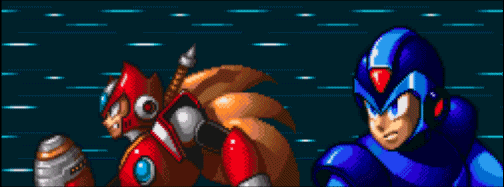
Capcom and the development team finally gave fans what they wanted: midway through the first stage, X is taken prisoner and Zero busts onto the scene through the ceiling. You see his life bar fill up. The music changes. Suddenly you realize, you are playing as Zero! Finally! Oh my god! The powerful blaster! The emerald nipples! The freaking light saber! It’s all in your control! The cool character you always thought would remain just out of reach is now you. You are him. You dash ahead and obliterate enemies with the smallest of shots, until you find X and his captor. You defeat the latter just by looking at him, and X is released. A dialogue window opens as the cool music continues, and Zero drops a bomb:
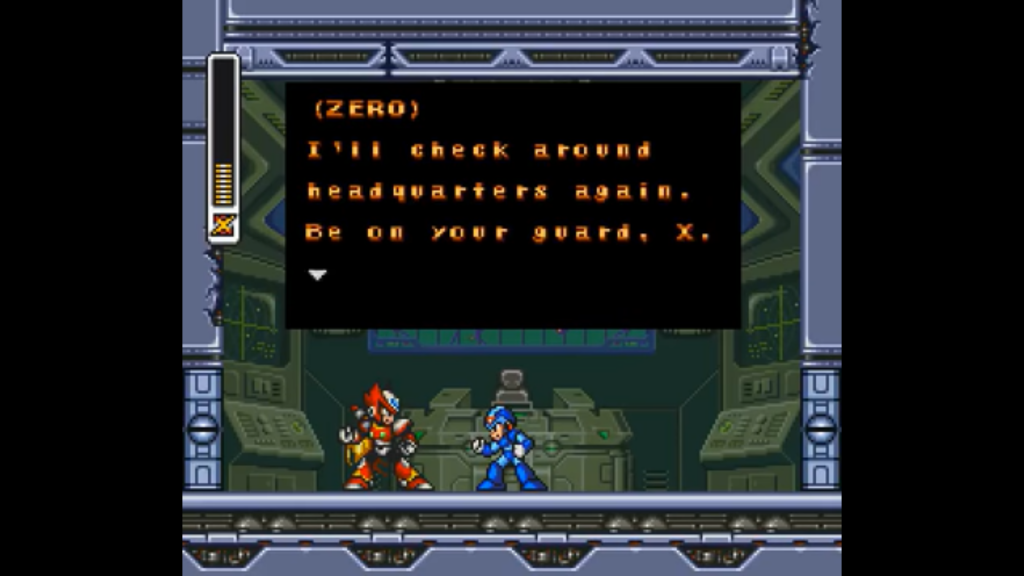
Wait. What?
But by now I was used to it. I finish the level as X again, finding I actually rather prefer playing as X anyway because he’s smaller, more compact, more nimble, less prone to taking hits from enemy fire. Go X, let Zero check around headquarters all he wants, you don’t need him anymore. You are strong. You are confident.
You destroy the boss at the end of the level, and of course Zero has to show up once again like some micromanaging PM to remind you that he’s going to be checking emails or returning videotapes or taking out the trash or whatever he is needed for back at headquarters, and that he is just a phone call away.
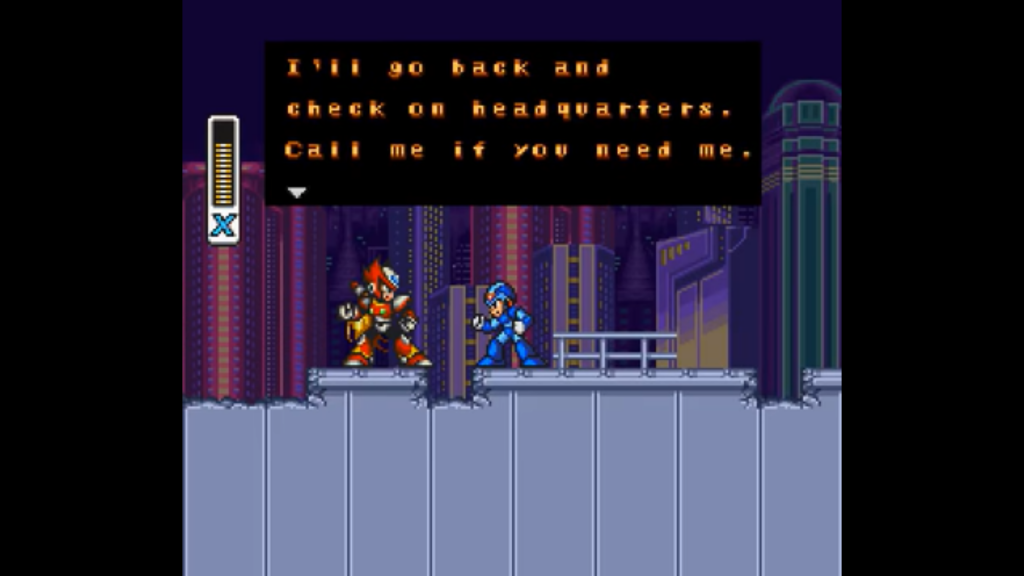
Thanks Zero, but I’ve been playing this trilogy for four years now and I’m not that naive. I know that the developers have made it so that when I change to playing as you even once and die, you will never be available again. While X can die an infinite number of times, you can die only once. Did Dr. Light forget to implant a “Continue” microchip in your nipples? No. You’re too delicate, too powerful, too cool, too advanced a character to be useful to my button-mashing fourteen-year-old self right now.
After months and months I finally beat the eight standard bosses of X3 and progressed to the final stages, presumably to face Sigma at the end. By now the finish line is in view and my tunnel vision is engaged. X and I are one. My thoughts are his. He moves with the slightest twitch of my finger. We have acquired all of the upgrades and we look badass. We beat a mini-boss and as expected the all-powerful Zero pops in only to help hold up a collapsing ceiling. At this point, it looks like he’s just showing up at strategic moments to make himself look busy. Maybe headquarters is running short on administrative tasks. Maybe he’s actually not as good a manager as he imagined and misses field work. Work which, by now, has been taken up by the smaller guy whom he initially, reluctantly, helped to support. When we rendez-vous after the mini-boss with the collapsing ceiling, he spouts some vague drivel about scouting around again. I doubt he’s even trying anymore.
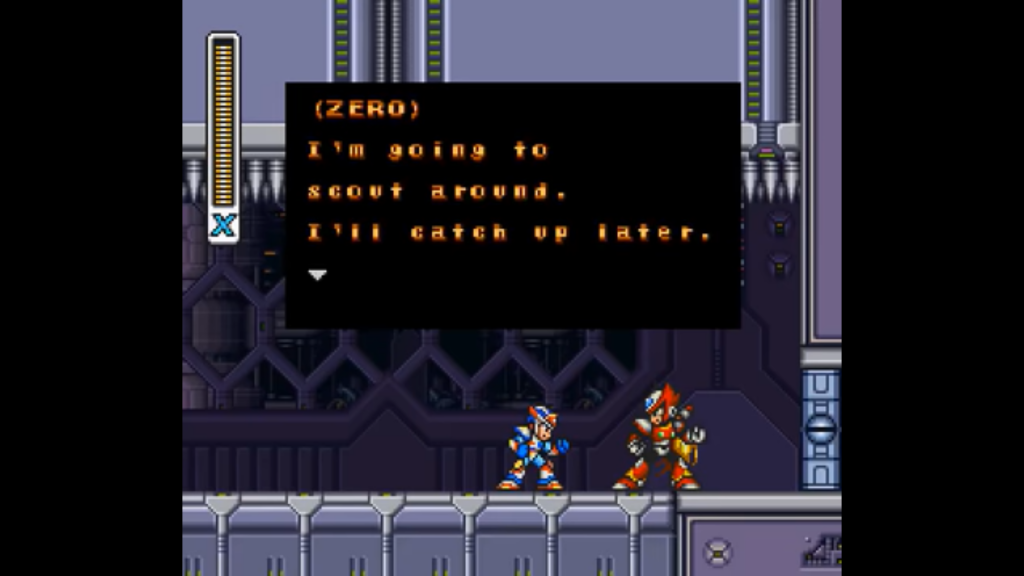
Again, dude, shouldn’t the smaller, more compact soldier be doing the scouting, while the massive fire engine red one with the asteroidal ponytail and light saber be doing the fighting? And what is this later? With all your management experience gathering information, checking with headquarters, and scouting everywhere, I’d imagine you’d have a more precise schedule in mind. Can’t you come up with a decent estimate when we will see you again?
You know something? It doesn’t matter.
I forge ahead, incapacitate Sigma which by now is second nature, and Zero shows up to deliver the coup de grace just as our archenemy flounders. He’s late. With all his experience, he still shows up late.
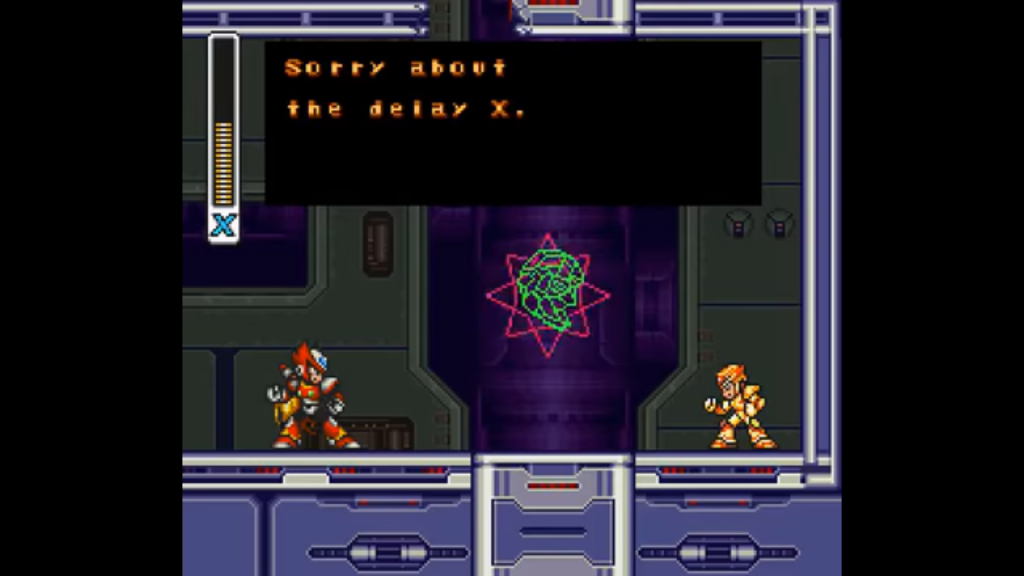
Sorry about the delay, X.
I close my eyes and shake my head. It’s OK, Zero. While you were gone, I have become golden. I have defeated Sigma three times now without your help. I have died 477 times since the first game in the trilogy, and I am better for it. I would venture that I am now more powerful than you. Maybe it’s time for me to go scout around headquarters, and let you be the boots on the ground.
So what were the developers of the Mega Man X series really on to? They dared to introduce a character that they knew everyone would find cooler than the protagonist, then awkwardly forced him into supporting positions throughout the story, building up anticipation, until finally delivering the gamer’s dream to play as him, only to discover that control starkly limited and ultimately having no bearing on the outcome of the story. Zero’s persona was neutered: just beyond the player’s grasp in the beginning, unimpactful and inconsequential at the end.
But you know something? It wasn’t as disappointing as it seems. At the end of the trilogy, I had played myself into X’s skin. I realized I was more of a personality match for the blue prepubescent soldier robot than that universe’s version of Thor anyway. Because in real life, that was me. I was the pint-sized adolescent trying to do well in school and be cool and have friends despite the fact that neither did I display traditional masculine traits nor did I aspire to. But what motivated me in the first place? It actually was that display, or at least the sense of success that the display brings, that pushed me forward, always chasing the platonic ideal of success while letting my own abilities burgeon unscrutinized. Good thing, too, because they would have wilted under scrutiny. I needed that model to aspire to because attachment to a desirable image happens in an instant while self-cultivation happens over time. And it should not be considered a failure when the self that is cultivated does not resemble the initial ideal. Better if it doesn’t, in fact. In Zero I learned the importance of unreasonable, impossible aspirations… and in X I learned the importance of self-discovery.


2 replies on “Aspiration Man X”
Umm… Ivan, you know this isn’t a trilogy right?
There are more Mega Man X games for PSX and PS2 (though they are of dubious quality).
Thomas, yes you are correct, there are many more. I suppose my intention was to specifically frame the first three as a discrete group, then when Capcom made the move to PSX that was like “Gen 2.” But now that you mention it, there’s no reason this story couldn’t apply to the rest as well. Would have to dig through lots more cutscenes!